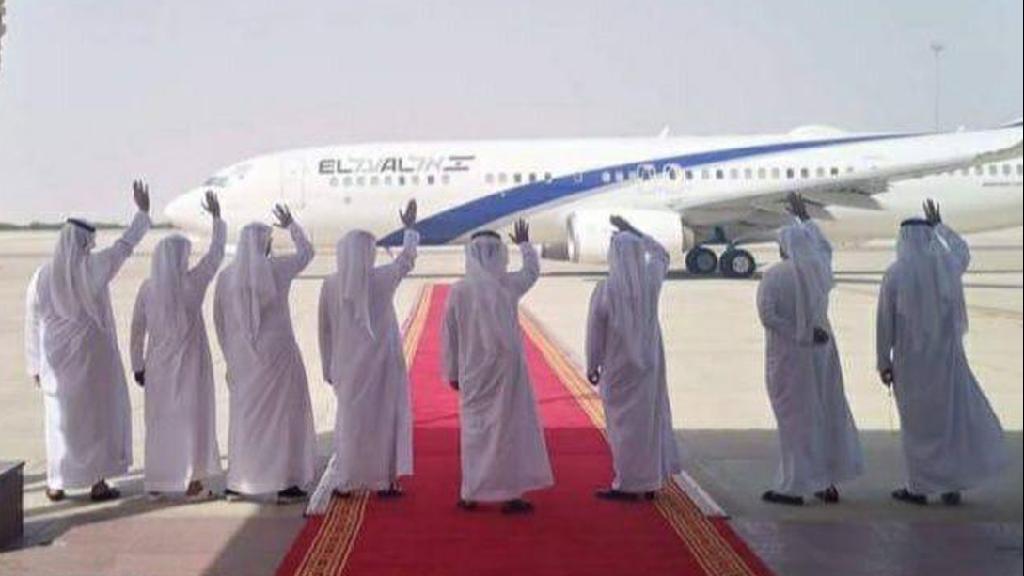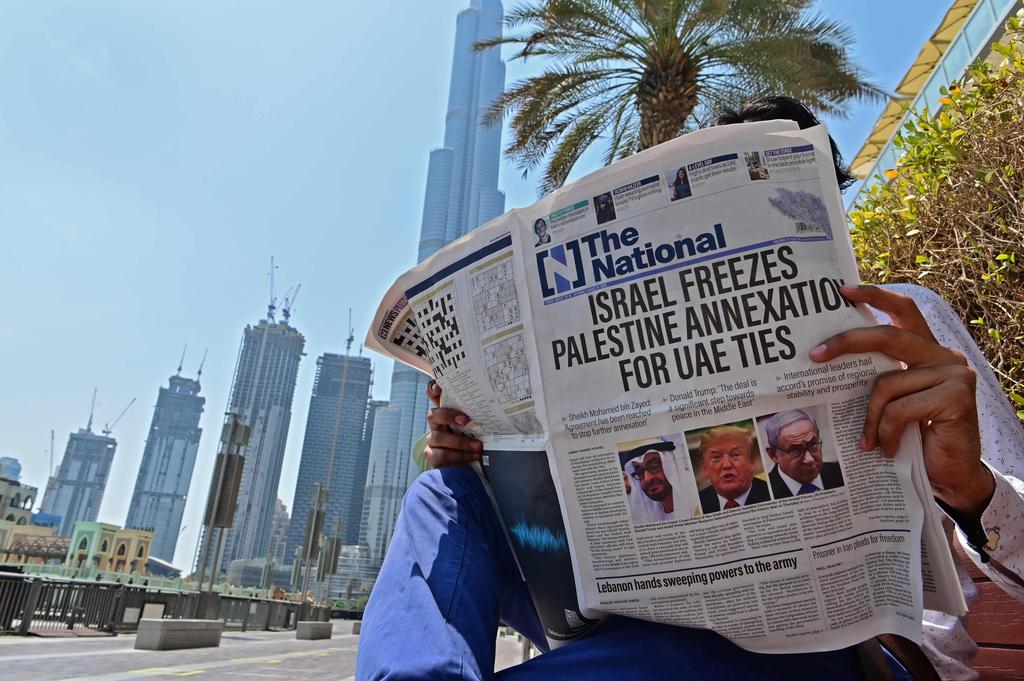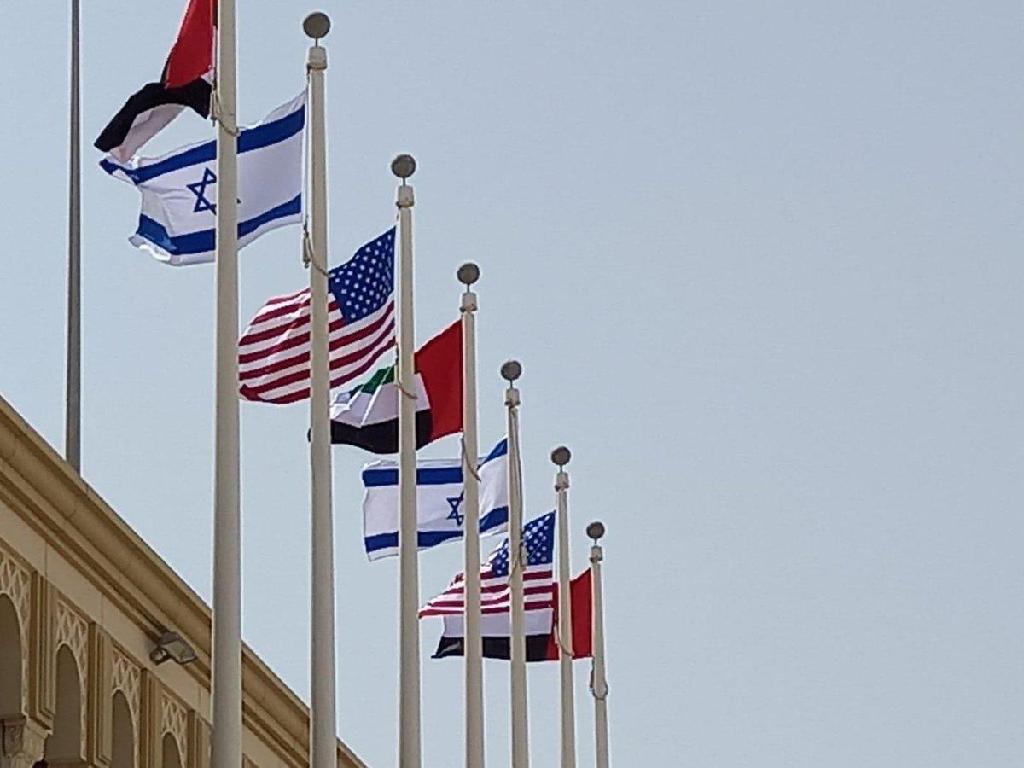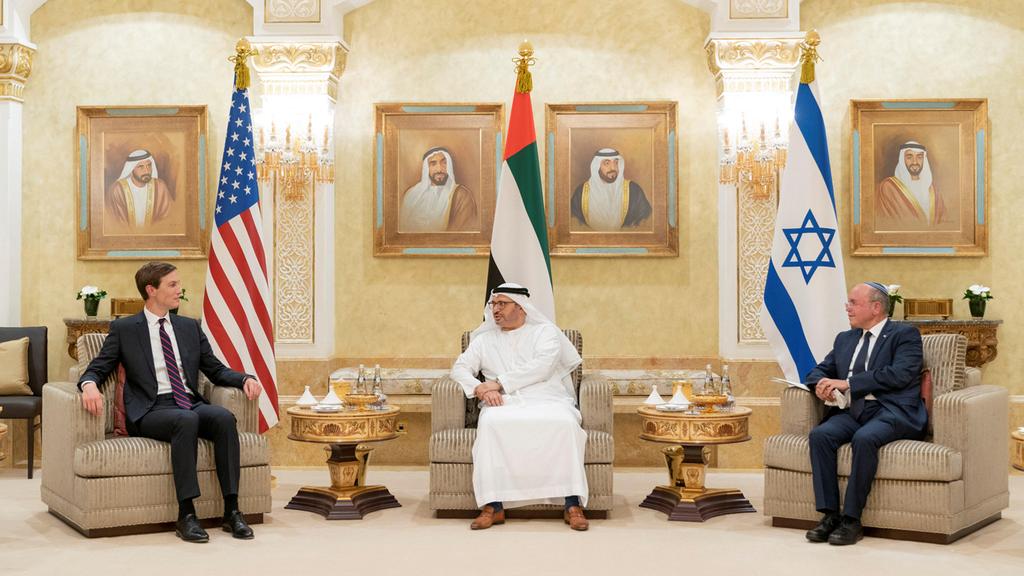Getting your Trinity Audio player ready...
We often trouble ourselves over trivialities to the extent that we struggle to see the bigger picture.
The Israeli delegation's official visit to the UAE - flying in Saudi Arabian airsace on an El Al plane with the kingdom's permission - is a day of celebration for Israel.
7 View gallery


Emirati officials wave farewell as an El Al plane prepares to take off from Abu Dhabi for Tel Aviv on Tuesday
(Photo: Ofir Malka)
We wanted a new Middle East and here it is taking shape right before our eyes.
We would have been happy if the Palestinians could also have joined us. We would have been happy to see Israeli flags hoisted across Ramallah.
This has yet to happen, but it is also not enough of a reason to lament that the Israeli flag "only" flew over Saudi territory and not on it.
Critics insist that nothing too dramatic has happened since Israel has had clandestine ties with the Gulf states for many years.
I have already visited two Gulf states - Bahrain and Qatar - in the 1990s, and I have even traveled to Yemen, but then the second Intifada erupted, and everything came to a screeching halt.
All overt ties became covert or simply ceased to exist. The enemies of normalization ruled and the perennially stubborn Palestinians dictated policies.
7 View gallery


Leading the Israeli delegation, National Security Council Director Meir Ben Shabatt meets UAE Crown Prince Muhammed bin Zayed
(Photo: GPO)
Now everything has changed, and we have told them: "no more."
The proponents of normalization have raised their heads, not because of their love for Israel, but due to their own interests.
This is wonderful. I wish the Palestinian could also join the party and act in their own interests, but they much prefer to act against themselves. It has become second nature to them - and while it hurts us, but it hurts them much more.
"What’s all this ruckus about? After all, the UAE is a dictatorship," some critics shrieked.
I find their claim funny since they were the same ones to disparage and belittle former U.S. president George Bush as he tried to spread the good gospel of democracy and pondered who had put him in charge.
7 View gallery


Palestinians in Nablus burn images of PM Netanyahu, UAE Crown Prince Mohammed bin Zayed and U.S. President Trump in response to the Israel-UAE agreement
(Photo: EPA)
Now, the eternally discontent are asking the same question of Israel.
So what do they suggest we do? Break ties with Egypt and Jordan as well? They're also not democracies, after all.
These are the same people who roll in the Palestinian mud and preach to us about the need to reconcile with Hamas, because this is important, and claims about their lack of democracy are just a poor excuse to avoid compromise and peace.
They actually do make a good point about the Palestinians. We shouldn't trouble ourselves too much with the Palestinian entity's ranking on the democracy scale. So they should do us all a favor and quit whining over other Arab regimes.
7 View gallery


A man in Dubai reads a local newspaper reporting on the Israel-UAE peace deal
(Photo: AFP)
Is this trend within the Arab world real, or is it simply an agreement between leaders that has nothing to do with Arab public opinion?
There is still no polling to back this assumption but scouring through Arab media clearly shows that something is going on over there and it didn't begin with the Israel-UAE deal.
Those who followed the Middle East Media Research Institution (MEMRI) down the years know it is a process.
Articles we would not have dreamed of reading two or three decades ago are published today not only on sites operating in the West but in leading newspapers in Arab countries.
Prominent Saudi journalist Mashari Althaydi wrote that the UAE reached an "historic achievement."
Yemeni economist Manahel Thabet published an article praising Israel's scientific achievements and called on Arab countries to cooperate with Israel.
7 View gallery


Israelis, American and Emirati flags flying at Abu Dhabi Airport
(Photo: Foreign Ministry of Israel)
They are not backing away from the Palestinian cause. This is something much more important. It is a change in attitude – peace through mutual interests and normalization, not through boycotts.
The detractors, even those on our side, continue to stamp their feet, demanding we continue down the path that has failed the Palestinians for almost a century, demanding more boycotts and recalcitrance.
This has never worked, but what difference does it make? They are so blind in their antagonism toward Israel that even supporting the Islamist Qatar-Turkey-Hamas-Iran coalition seems normal to them.
We need more such breakthroughs with Sudan and Saudi Arabia, with Bahrain and Oman. Maybe even Morocco, where Israeli tourists were already traveling nonstop before COVID-19 struck.
7 View gallery


The El Al plane which carried the Israeli delegation to the UAE with the word 'Peace' written in English, Hebrew and Arabic on the front
(Photo: GPO)
This new agreement will not push peace with the Palestinians any further away. Quite the reverse: it will make it clear to them that they must change direction too.
There are many good people on the Palestinian side who understand that they need change and this agreement with the UAE and relations with other countries strengthen them.
So in historic terms, the visit that started on Monday is definitely a holiday, and hopefully, more days like this are yet to come.


